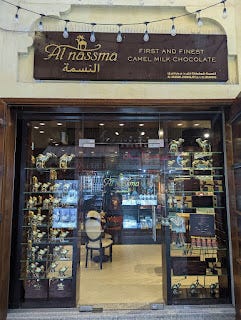A Different Kind of Chocolate

With Covid having prevented my wife and I from celebrating a significant anniversary milestone, we finally took a long-overdue vacation - to the new hottest destination for Israelis, Dubai. It was exceedingly interesting, but in this post I'll just discuss one thing: chocolate.
Wandering around the fascinating spice and gold souks, I came across an upscale store selling chocolate. But this was like no other chocolate store I had ever seen. Most of the gold-covered chocolates were shaped in form of a camel, and the reason for this was that they were made of camel milk!
The Al-Nassma chocolate company uses milk from 3,000 camels at the Camelicious Farm in Umm Nahad, Dubai, which also produces bottles of camel milk and camel ice cream. The camels are milked twice daily, producing 5000 liters of milk. Camel milk is long favored by the Bedouin, and is richer in vitamin C than cow milk, while being lower in fat and lactose.
Camel milk is, of course, as treif as treif can be. But I decided to buy some of the unusual looking chocolate to exhibit at the Biblical Museum of Natural History in our Hall of Kosher Classification, alongside some other highly unusual camel-related items that I purchased on this trip. As I lined up at the counter, the man in front of me said, "Watch out, it's so delicious, you'll get addicted to it!"
Although he spoke to me in English, his heavy accent sounded all too familiar.
"Me'efa atah?" I asked in Ivrit. "Haifa," he replied.

I felt obligated to point out that the chocolate really is made from camel milk and is non-kosher. He responded indignantly that we don't even know what's in the water that we drink, so we might as well eat camel chocolate too. I must confess that I failed to follow this argument.
Interestingly, the Bedouin predilection for camel milk explains something in the Torah that I discussed in my book The Camel, The Hare And The Hyrax. Since the Torah specifies that animals must both bring up the cud and possess split hooves, the camel - which lacks hooves entirely - is obviously not kosher. Why, then, does the Torah need to warn us against eating it, along with the hare, hyrax and pig? The Sifra states that the presence of one kosher sign might lead a person to think that it's acceptable to eat them. But Chizkuni explains further that since the local nations eat such things, there is extra reason to spell out that they may not be eaten.

But what about those Jews visiting Dubai who, unlike the man from Haifa, keep kosher? Can they have regular milk in their coffee? Or does the local predilection for camel milk mean that there is a risk of camel milk being mixed in to regular milk? Instead of chalav Yisrael, could they be drinking chalav Yishmael?
It seems to me that there is no such risk. Although in some ways the UAE is far from a First World country - it's an authoritarian regime with no free press - in other ways it is highly advanced, including having very strict laws on quality control in food and correct labeling.
But there's also another reason. Camels produce much less milk every day than modern dairy cow breeds. In addition, whereas male cattle calves are often killed, every camel must be kept near its young in order to continue producing milk, which means that two animals need to be kept fed. As a result of all this, camel milk is around thirty times more expensive than cow milk. The Gemara (Avoda Zara 34b) explains that there is no concern of non-kosher wine being secretly added to unsupervised imported fish stew in places where wine is more expensive, since there is no financial incentive to do so. The same logic would apply in Dubai - there is simply no incentive for dairy farms to use camel milk instead of cow milk.
However, with the enormous number of Israelis visiting Dubai, it's important for people to be aware that some of the chocolate there is very, very treife!
(Meanwhile, I am kicking myself for not buying a bottle of camel milk, emptying it, and bringing it back for a museum exhibit. So if you happen to be in Dubai, please get one for us!)


